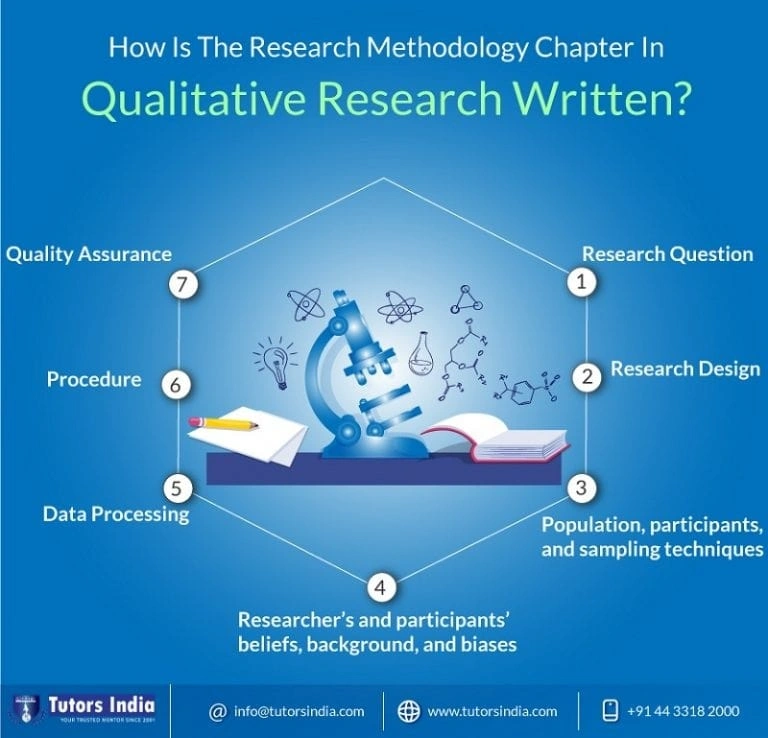How Is The Research Methodology Chapter In Qualitative Research Written?
Research methodology for qualitative research is about how to carry out a research, that is, the procedure by which the researchers describe, explain and predict a phenomenon. In short, it provides enough information for another researcher/ investigator reading the dissertation to replicate the study.
Qualitative study is exploratory in nature. In essence, it is about making observations and developing theory. Qualitative research is a method of inquiry that helps to provide insights and understanding of the problem settings. The research methodology involves variety of methods of data collection from unstructured to semi structured methods that includes focus groups, individual participation like writing to a service center about their opinions, observation, etc. The research tends to include what an individual feels and experience and does not involve numerical data.

Research methodology is usually featured as the third chapter in a dissertation. It is a description of the action and decisions taken, the justifications for it from the point of view of the study, and the process that was involved in implementation and analysis.
Research methodology for a qualitative research usually includes information on:
- Research Question,
- Research Design,
- Researcher, And Participant’s Background, Beliefs, And Biases,
- Population, Participants, And Sampling Techniques,
- Procedure,
- How The Data Is Processed,
- Quality Assurance.
Research Question
The researcher needs to state the question that prompted them to conduct the research and provide a justification as to how it addresses the issue in hand. Research questions that involve qualitative research are usually open-ended with a need to explore a problem.
Research Design
It is the framework of the research. Researcher mentions the approach of the research and justifies it’s aptness to the study. For qualitative research, there are five main approaches, namely: phenomenological, grounded theory, case study, and ethnography. Then the specific philosophical paradigm (trans-formative, social-constructivism, or pragmatism) is stated and analyzed with respect to the three basic philosophical assumptions: ontological, epistemological, and axiological.
Researcher’s And Participants’ Beliefs, Background, And Biases
Researcher provides basic information on their background, beliefs, and biases, so the reader may have a clearer or understanding of the researcher and their study and findings. Also a brief outline of the same for the participants’ are provided.
Population, Participants, And Sampling Techniques
In this chapter the researcher provides the reader with information on the population or community chosen for the study, the participants studied and the reasons for why they were chosen, the sampling technique used to choose the said participants and the appropriateness of the technique to the study, the adequacy of the number of participants.
Procedure
Researcher describes the process of data collection, the setting and the length of the interviews, the kind of data collected, specific actions taken, and the actions of the participants during the study. The heading includes the strategies of data collection and the characteristics of the data collected.
Data Processing
Data processing contains information on the data analysis in qualitative research. The researcher explains his analysis plan for qualitative research and how it addressed the research questions.
Quality Assurance
The researcher in this epilogue to their methodology chapter explains the credibility, transfer-ability, and the dependability of their research, dwelling into the accuracy of the study with respect to participants’ experience, the validity, precision, the reliability of the results and procedure in similar contexts and studies.
The above information should provide an idea as to how to write the methodology chapter for qualitative analysis and is to be succinctly, providing precise information for future researchers whose conclusions may provide further validity to the study.
Links, References, Related Posts
– Choosing The Right Data Collection Methods For A Successful Thesis
– Why Tutors India for Econometric and Financial Statistical Analysis Support Services
– The Importance Of Having Biostatisticians On Every Clinical Research
– Why Tutors India for Statistical Support Services – Our Statistics Mentors
